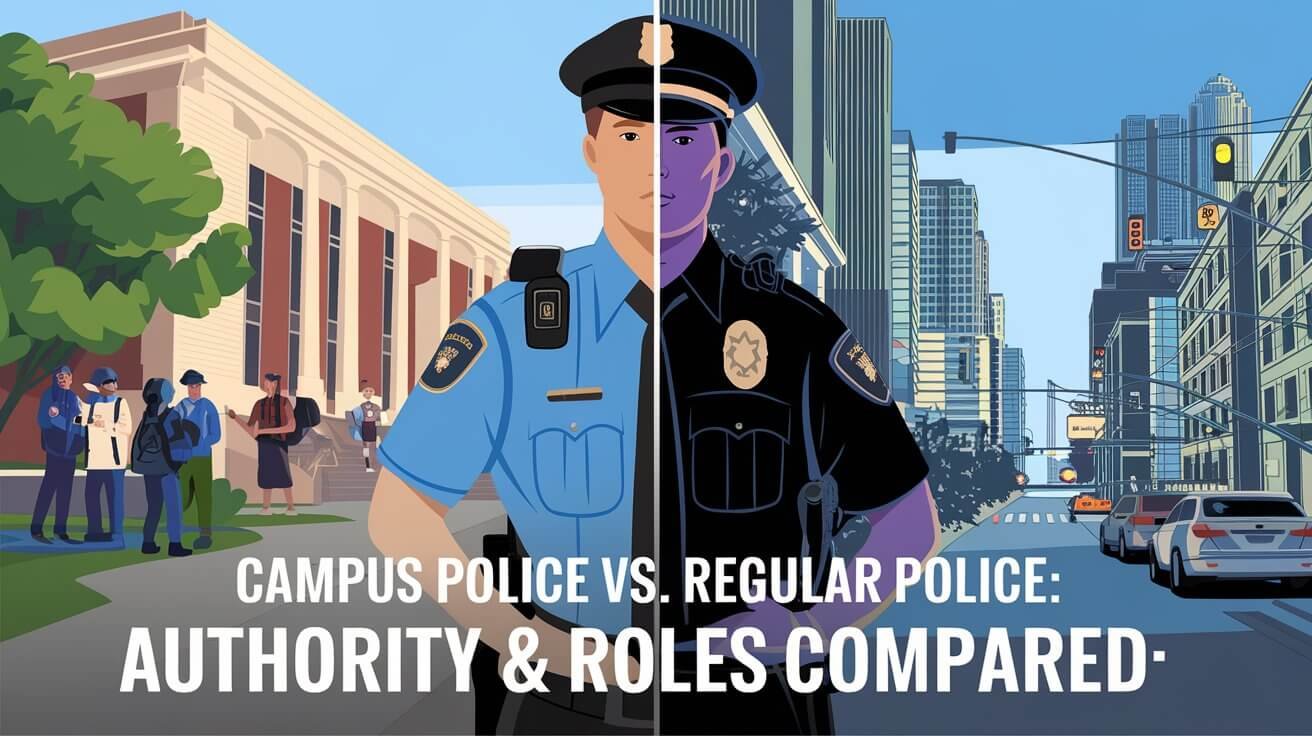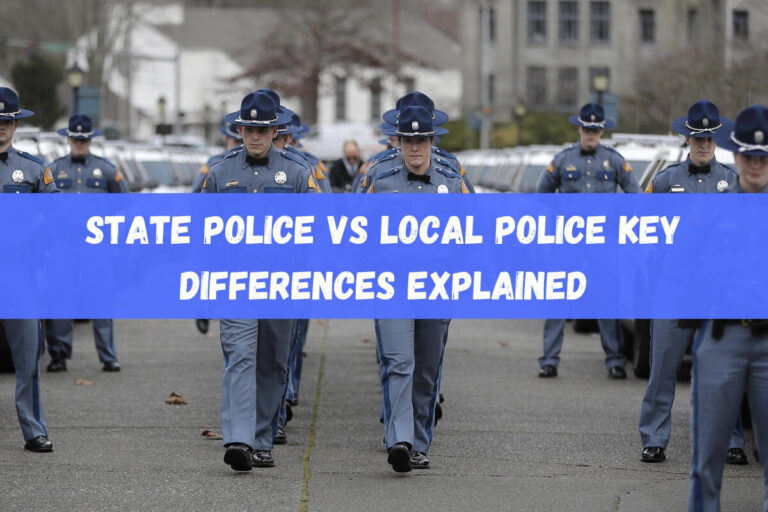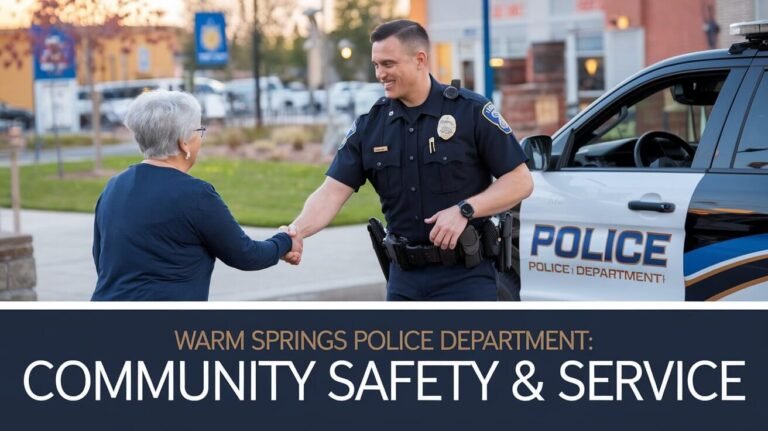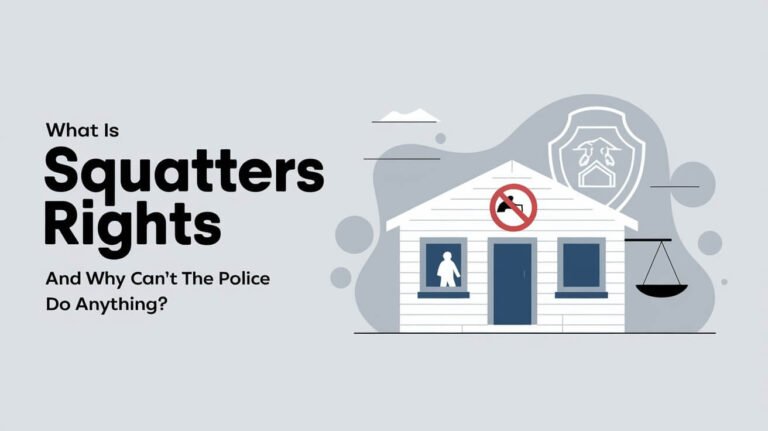Campus Police Vs Regular Police: Authority & Roles Compared

Campus police and regular police have different jobs and ways of working. But what makes them different? Let’s find out. As we look into campus policing, a big question is: How do campus police officers differ from their counterparts in traditional law enforcement?
Campus police get special training and focus on the community. We’ll see how these differences shape their roles and duties.
Defining Campus Police and Traditional Law Enforcement
Campus policing has changed a lot over the years. It has moved from simple security guards to fully-trained, sworn officers. These officers have strong jurisdictional authority and keep public safety on campus. The history of campus policing started in the 1960s and 1970s. This was when campuses in the U.S. faced more civil unrest and security issues.
History of Campus Policing
Universities created their own police forces to handle these problems. The first campus police were often from the military or local police. They were responsible for keeping order and protecting the campus community.
Evolution of University Law Enforcement
Now, campus police departments are more professional. Officers get a lot of training and are certified. Today, campus police officers can arrest people, investigate crimes, and enforce laws on campus and nearby areas.
Modern Campus Security Structure
Setting up campus police forces needs approval from university leaders and local courts. These approvals give campus police the power and resources they need. This ensures they can keep public safety on college and university campuses.
Legal Authority and Jurisdiction Boundaries
Campus police departments follow state laws, like the Virginia Campus Police Act of 1977. This law lets colleges have their own police with the same power as local police around their campuses. In some places, campus police can work anywhere in the state, but only for campus-related issues.
They often work with local police, needing to agree on how to share duties. This cooperation is key to keeping everyone safe.
It’s smart to have one agreement that covers all law enforcement groups. This makes sure everyone knows their role. It’s also good to have maps ready in police systems so they know who to call for help.
Regular talks and team-building between campus and local police are a must. This helps them work better together and understand their areas of responsibility.
The agreement between schools and police should be clear about who does what. It should cover things like where police can work, how to handle crimes off campus, and how to share crime data. Training is crucial for campus police to know and follow these rules.
Campus police are now working outside their campuses more often. Some schools are adding more officers to cover more areas. Others are debating whether to let their officers carry guns, after a recent shooting in Texas.
| Case Study: VCU Police Department |
|---|
| VCU Police Department has 95 sworn police officers budgeted. VCU Police officers have concurrent jurisdiction with the City of Richmond’s Department of Police. VCU Police has had concurrent jurisdiction with Richmond Police for more than 30 years. VCU Police Department received an expansion of jurisdictional boundaries within the City of Richmond in 2019 and December 2023. VCU Police have the same arrest authority as the Richmond Police Department. VCU Police officers have the authority to respond to calls for service from students, faculty, and staff in expanded jurisdiction areas. RMC Events security staff are not sworn police officers and can provide security services in VCU-owned or controlled buildings. VCU Police Department’s primary focus is to ensure safe learning, living, and working environments for students, faculty, and staff. |
In a case from United Educators, campus police wrongly arrested students at a party. This mistake led to a student losing an internship and suing the school. It shows how important it is for campus police and local police to work together and know their limits.
Campus Police Vs Regular Police: Core Functions and Responsibilities
Campus police are key to keeping schools safe in the U.S. They work differently than regular police, focusing on the unique needs of schools. Their job is to keep students, teachers, and staff safe.
Daily Operations Comparison
Campus police patrol school grounds and handle incidents. They also enforce school rules. Regular police cover larger areas and deal with many types of emergencies, including school ones.
Emergency Response Protocols
Campus police know their schools well, helping them respond fast in emergencies. They get special training for active shooter situations and practice drills. They use technology like BluePoint’s Police Alert System to quickly alert everyone in emergencies.
Community Engagement Requirements
Campus police work with local police, like the Metropolitan Police Department (MPD), to handle many calls. This teamwork is crucial for managing crises and keeping everyone safe. It helps schools have a strong safety plan in place.
| Metric | Campus Police | Regular Police |
|---|---|---|
| Jurisdiction | Property owned, operated, leased, or managed by the university or college | Specific geographical areas within the broader community |
| Training | Attend certified police academy or the Consortium of Universities Campus Public Safety Institute | Complete standard police academy training |
| Arrest Authority | Have arrest authority on campus property | Have arrest authority within their jurisdiction |
| Weapon Policies | Decided by each university or college | Determined by local law enforcement agency |
| Typical Calls | Theft, disorderly conduct, suspicious persons, hate crimes, fire and intruder alarms | Wide range of calls, including emergencies within schools and criminal activities in the broader community |
| Staffing | Most universities and colleges have a 24/7 police presence on campus, with staffing levels varying by institution | Staffing levels determined by the local law enforcement agency and community needs |
Training Requirements and Specializations
Campus police officers get special training that makes them stand out. They learn about being sensitive, understanding different cultures, and how to calm situations without force. These skills help keep campuses safe and welcoming for everyone.
They also learn about laws that are specific to colleges, like FERPA, HIPAA, Title IX, and the Clery Act. This extra knowledge helps them do their job well.
In places like Virginia, campus police and city police go to the same training academy. But campus officers get extra lessons that fit their job needs. This way, they can handle student issues and follow privacy laws correctly.
| Education Level | Percentage of Sworn Officers |
|---|---|
| 2-year Degree | 51.8% |
| 4-year Degree | 30.2% |
| Graduate Degree | 5.4% |
The special training and education for campus sworn officers have made their jobs more professional. With more people wanting to be in law enforcement, having a college degree helps campus police stand out.
Crime Prevention and Response Strategies
Campus police departments focus on preventing crime to keep everyone safe. They use engagement, education, and teamwork to stop crimes before they happen. This approach is different from traditional law enforcement.
Preventive Measures on Campus
- Georgetown University Police Department (GUPD) employs Student Guards to support security at building entrances and enforce access policies.
- GUPD offers self-defense classes, including four-hour workshops covering risk reduction and hands-on techniques.
- The university’s Sexual Assault Response Team (SART) includes specially trained officers to handle sensitive cases.
- Crime prevention services include safety presentations, security audits, laptop and equipment registration, and bicycle registration.
- GUPD’s Community Liaison Officer Program strengthens relationships between the department and the campus community.
Investigation Procedures
When crimes happen, campus police work with university resources like counseling services. They do detailed investigations. Their reports are more detailed than traditional law enforcement to ensure complete case files.
Incident Documentation
Accurate and detailed incident reports are key for campus police. They include officer information, witness statements, and any disciplinary actions. This helps the university follow the law and support its judicial process.
| Preventive Measure | Description |
|---|---|
| Student Guards | Support security guards at building entrances to enhance access control |
| Self-Defense Classes | Four-hour workshops covering risk reduction and hands-on techniques |
| Sexual Assault Response Team (SART) | Specially trained officers to handle sensitive cases |
| Crime Prevention Services | Safety presentations, security audits, laptop/equipment registration, and bicycle registration |
| Community Liaison Officer Program | Strengthens relationships between the campus police and the community |
Disciplinary Actions and Enforcement Options
University security and campus safety are key concerns. College law enforcement officers have more freedom than regular police. They can choose between arresting students or sending them to the dean of students.
This method helps in guiding students rather than just punishing them. It’s about teaching and supporting their growth. Campus police are trained to be sensitive and understanding, focusing on community safety.
- Most campus police officers used to work as traditional police.
- They get special training on non-lethal force and understanding different cultures.
- Campus police work hard to prevent crimes and build trust with students.
- They need to be good at talking to people, listening, and being patient.
The power of campus police to use force can change. It depends on if the university is private or public, and the state laws. Public universities often have sworn officers with full powers. Private universities might have smaller security teams or work with private firms.
| Enforcement Approach | Public Universities | Private Universities |
|---|---|---|
| Police Powers | Sworn officers can arrest and use force, sometimes across the whole state. | Private universities have smaller teams, often needing local police for help. |
| Search and Seizure | Refusing a search without a warrant can lead to disciplinary action. | Refusing a search without a warrant might lead to university action. |
| DUI Enforcement | Implied consent laws apply, with license suspension for refusing a breathalyzer test. | Universities might offer programs for first-time DUI offenders, but students should check their school’s resources. |
Campus police try to balance enforcement with guidance. They must also protect students’ rights, like free speech during protests.
Community Policing Approaches
Campus police departments focus on community policing. They work hard to build strong relationships with students, faculty, and staff. This requires great communication skills, patience, and the ability to calm tense situations.
They team up with other university departments to make the campus safe and supportive for everyone.
Student Interaction Protocols
Campus police officers aim to have positive interactions with students. They are friendly and take part in campus events. This helps build trust and understanding, making the campus safer and more welcoming.
Faculty and Staff Relations
Good communication and teamwork with faculty and staff are key for campus police. They work with different departments to create safety plans and handle security issues quickly. This way, they can understand and meet the needs of the whole campus community.
Campus Safety Programs
- Offering self-defense workshops and personal safety seminars
- Organizing campus-wide emergency preparedness drills
- Implementing crime prevention initiatives, such as increased lighting and security cameras
- Collaborating with student organizations to promote safety awareness campaigns
These safety programs help empower the university community. They aim to make the campus a safe and thriving place for everyone.
Use of Force Policies and Regulations
Campus police officers play a key role in keeping colleges and universities safe. They follow strict use-of-force policies. These policies outline what force is okay, how to calm situations, and what to report.
These rules are made with legal advice and security experts. This ensures they follow state and local laws.
Important parts of these policies include defining what “noncompliant” or “extreme agitation” means. They also require officers to try to calm situations with words first. This helps avoid using physical force.
They also explain when and how much force is okay. This gives officers clear guidelines.
These policies also list specific techniques that are allowed or not allowed. For example, they might talk about neck restraints and when they can be used. Departments have rules for reporting the force used. They make sure these rules follow state and local laws.






